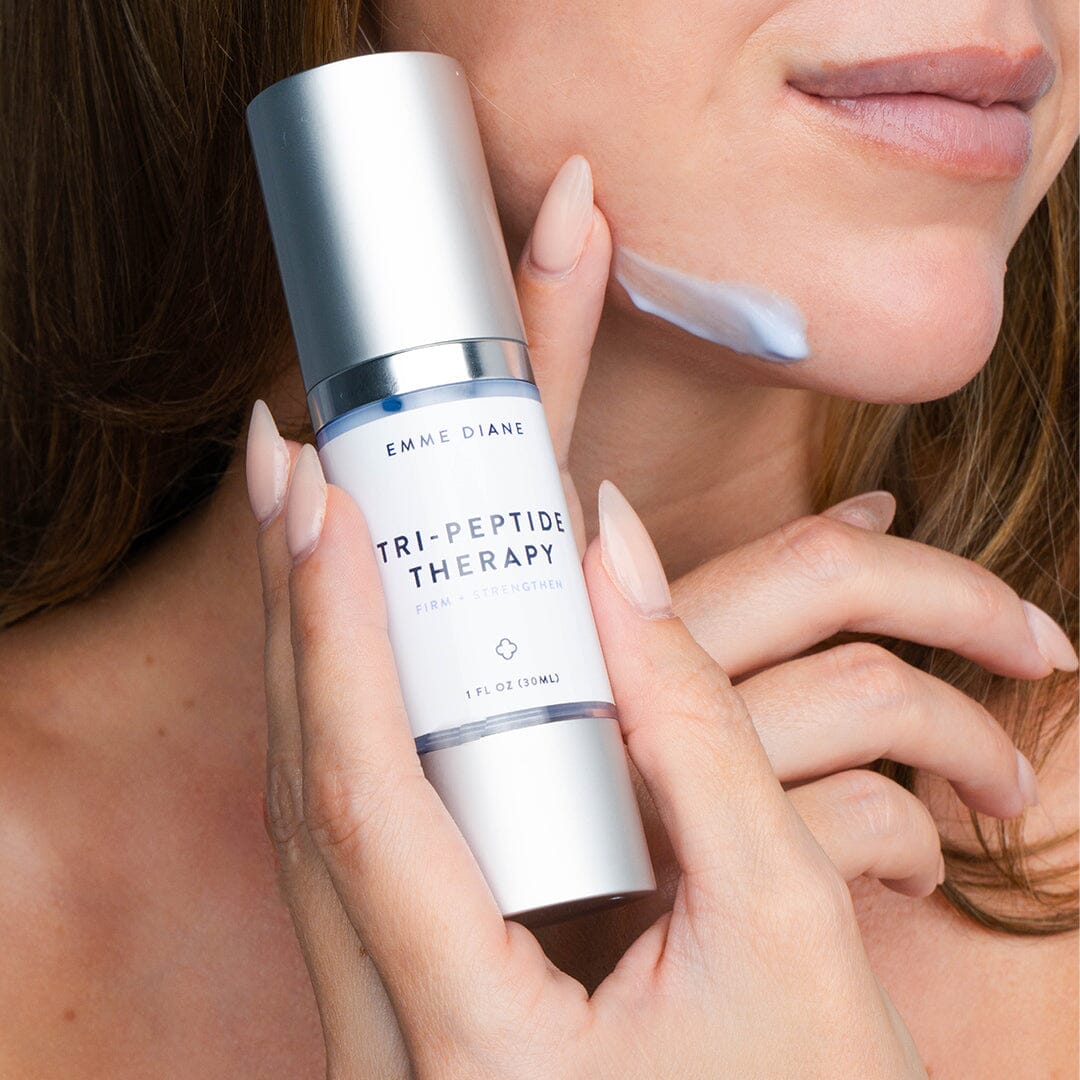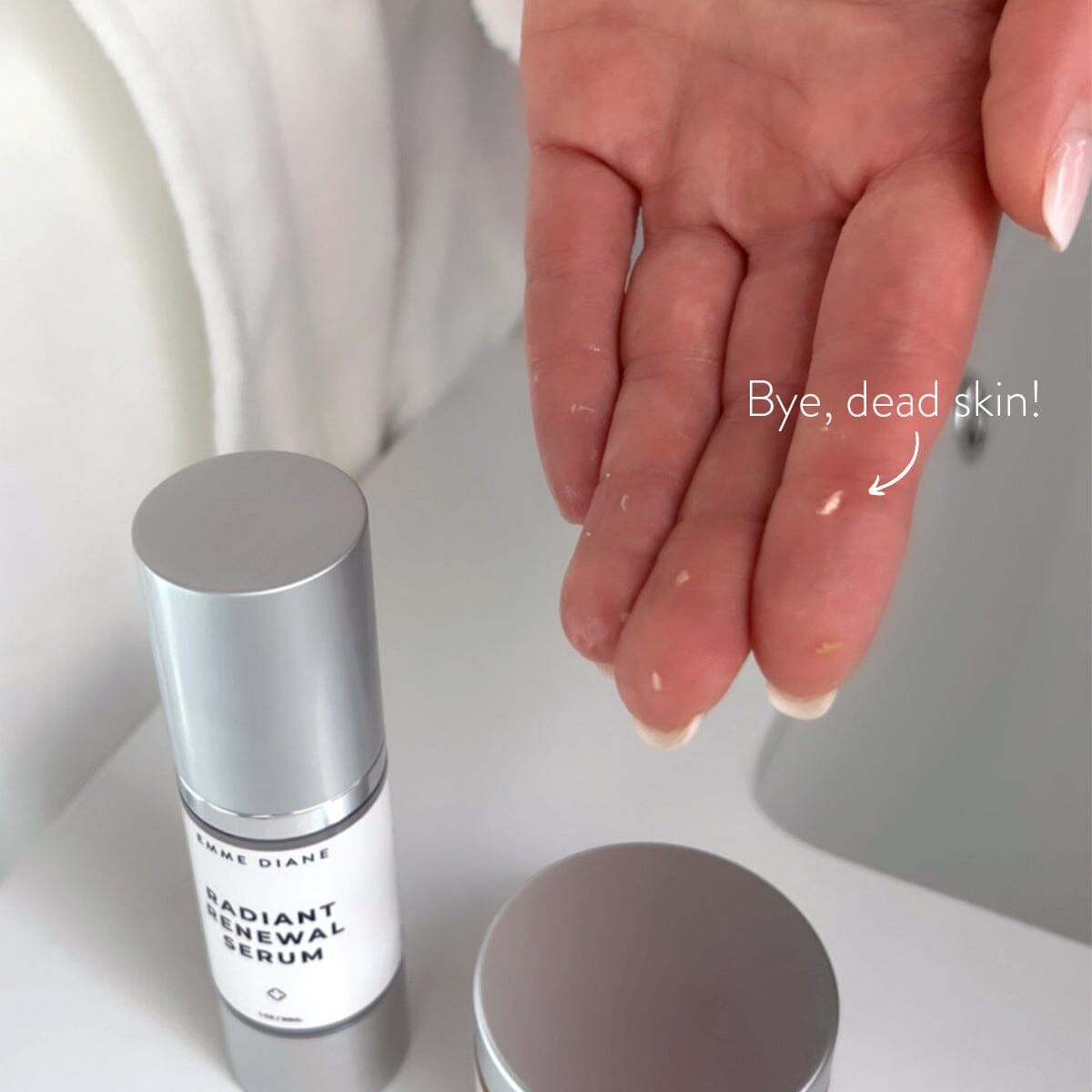The Truth About Scary Skincare Myths
by Emily Linehan on October 24, 2021
We've all heard scary skin stories from friends or even you might have a scary skin story of your own to share.
Stories we hear about skincare beliefs and products can go from scary to downright terrifying! Is Benzoyl Peroxide really bad for the skin? Or worse, can some ingredients cause cancer?
I'm here to talk about some popular skincare myths and the truth behind them!
MYTH 1: Benzoyl Peroxide Causes Premature Aging
If Benzoyl Peroxide prematurely ages the skin, it also must be bad for the skin...right? Wrong! This myth has floated around for years, but there is no truth to it. Benzoyl Peroxide often gets a bad rep because it can be irritating and drying to the skin when you first begin to use it. Learn exactly why Benzoyl Peroxide does not age your skin here. This is why it is so important to know how to use your skincare products. If you haven't taken my consultation, please start there so we can make sure you know which products will work best for you and how to use them properly!
MYTH 2: Ingredients like Hydroquinone and Kojic Acid Cause Cancer
Skincare ingredients often get a bad rep for being carcinogenic. Hydroquinone is one that you'll hear this about often, however, it isn't true. Decades ago, Hydroquinone creams and serum were found to be laced with mercury to enhance lightening, but the FDA banned mercury-containing skin bleaches in 1973. When this was the case, and Hydroquinone contained mercury, it was a dangerous ingredient. But since the ban, Hydroquinone skincare products produced in the USA no longer pose a threat as an ingredient in skincare.
Kojic Acid, on the other hand, is a robust brightening agent for those suffering from dark spots, sun damage, and hyperpigmentation. Over the years, rumors have floated around that Kojic Acid is cancer-causing as well. There have been 0 reported cases of cancer due to Kojic Acid. In fact, there have been 0 cancer cases due to Hydroquinone as well. Make sure you always purchase skincare from a reputable, US-based skincare brand.
MYTH 3: Retinols Thin the skin
When it comes to MVP ingredients in skincare, Retinols always win the popular vote. Retinols unclog pores, reduce fine lines and wrinkles, and brighten, smooth, and refine the skin. What isn't to love? Well, the rumor that it thins your skin. Fortunately, this couldn't be further from the truth! In fact, Retinols actually reverse skin damage and strengthens the skin. Because it increases cellular turnover and exfoliates the top layer of the skin, many believe this causes the skin to thin. However, on a deeper level, it improves the integrity of and thickens the dermis (where your collagen lives), leaving your skin healthier and stronger than before.
MYTH 4: Zinc Oxide Can Enter the Bloodstream
When we think of Zinc Oxide often we think of sunscreen. In the past, and still true today, sunscreen can leave a white cast on your face. However, as technology advances so does skincare. Now, Zinc Oxide can be broken up into nanoparticles, which makes it more lightweight on the face, non-greasy, and prevents that "white cast" from appearing.
However, concerns have risen about just how small these tiny nanoparticles of Zinc Oxide really are. So small, in fact, posing the question: Could it be possible for them to absorb through the skin and enter into the bloodstream?
Zinc Oxide alone cannot enter the bloodstream. With that being said, there is still a question as to whether or not Zinc Oxide nanoparticles can, though evidence suggests this is unlikely. Regardless, here at Emme Diane we only use non-nano Zinc Oxide and inert ingredients to coat the Zinc Oxide to ensure it cannot penetrate through the skin and enter the bloodstream.
MYTH 5: All PEG Contain Harmful Toxins
Polyethylene Glycol, often referred to as PEG, is a common, household ingredient that can be found in everything from cleaners to cosmetics. Its role as an ingredient is a simple, but important one. It softens, thickens, and emulsifies (carries moisture) - so you can see why it would be a common go-to in skincare formulation. PEG must go through a process during their production called ethoxylation. If this process is not done correctly, PEG can be contaminated with a byproduct called ethylene oxide, which is a cancer-causing compound. This is why it is so important to purchase skincare from reputable skincare brands that utilize high-quality labs to carefully create their formulas in order to avoid mistakes like this. Skincare truly is chemistry!
MYTH 6: Dimethicone in Skincare is Pore-Clogging
Dimethicone is a common, silicone-based ingredient. Its job is to improve the skin's smoothness and flexibility by filling gaps between the cells in the uppermost layer of your skin. Apart from that, it also excels at creating a physical barrier to seal in hydration, keeping skin moisturized throughout the day. However, a common myth is that Dimethicone is pore clogging, but this simply isn't true! Dimethicone creates a breathable barrier on the skin. It is not an occlusive ingredient and is very protective for those who have sensitive or problematic skin. It often gets confused as a pore-clogging ingredient as it has a silky, velvety feel, but Dimethicone is actually non-comedogenic!
MYTH 7: Gua Sha Helps Get Rid of Acne
These pretty, popular tools look great on our counters and in photographs, but I do not recommend them. There are benefits to Gua Sha, but the risks definitely outweigh them to me. One significant risk for anyone acne prone is the pressure on the skin. This pressure can potentially burst the follicle wall, triggering new acne - even cystic acne. When this happens, surrounding pores can also become infected and inflamed. Read more about skincare tools here.
MYTH 8: Coconut Oil is Good for the Skin
I talk about this in-depth in my post here, but Coconut Oil has amazing benefits...just not in skincare. The fatty acid composition of this oil is the reason why. It is 2/3 Oleic acid (also known as Omega 9) and 1/3 Linoleic acid (also known as Omega 6). Oleic acid is a huge acne trigger for those who have acne-prone skin. Coconut oil is highly comedogenic, which means it clogs the pores. Coconut Oil is also a hydrophobic oil, meaning that it repels moisture as opposed to attracting it (which the skin needs desperately. Continued use ultimately leads to increased skin dehydration and a compromised moisture barrier.
MYTH 9: Benzoyl Peroxide Can Make Your Acne Worse
This is something you will hear people say from time to time. Benzoyl peroxide cannot make your acne worse. However. It absolutely has an acclimation period and, if used incorrectly, will not give you the results that you're hoping to see (clear skin!). Everybody is sensitive to benzoyl peroxide, period. This is why it's so important to use this product as directed and in the right order in your skincare routine. It's also why at Emme Diane, I start you with an acclimation process in order to acclimatize to the ingredient. There's a reason why Benzoyl Peroxide has been around for a long time and is still the most popular acne-bacteria-fighting ingredient out there. Because it works. Another important note to remember is that anytime you are working on clearing the skin, it takes 90 days for acne to form, so that means it also takes 90 days for acne to clear, in addition to a possible purging phase.
MYTH 10: You're Going to Age Exactly Like Your Parents Did
So, this is partially true. Of course you'll resemble your parents! However, this is mostly false when it comes to the skin and the signs of aging. This may surprise you, but only 10% of aging on the skin is inherited. That means 90% is environmental, lifestyle factors, behaviors, and habits that we all have far more control over. Read all about it here.
xoxo, Emme


